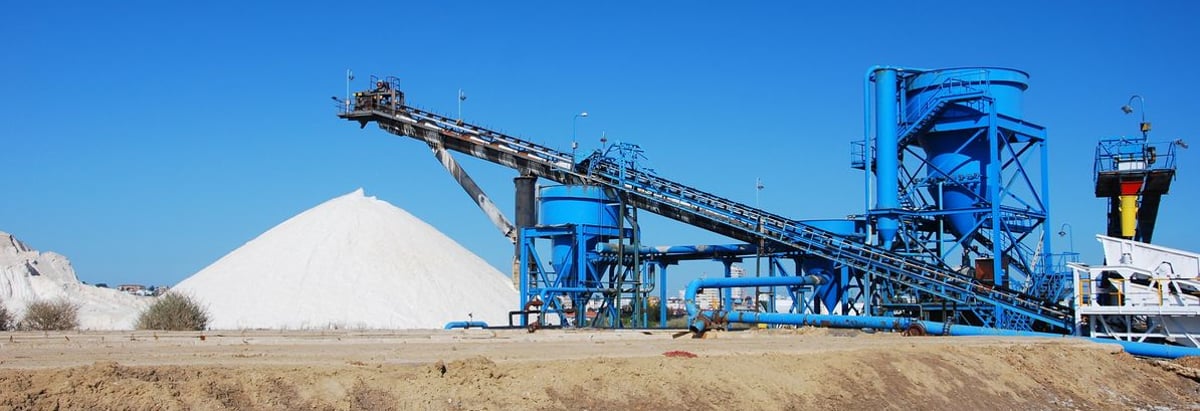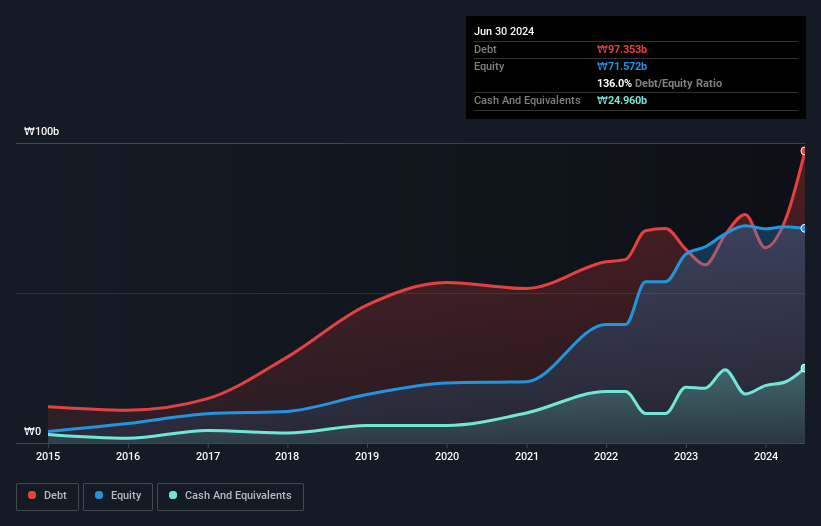- South Korea
- /
- Trade Distributors
- /
- KOSDAQ:A162300
Shin SteelLtd (KOSDAQ:162300) Takes On Some Risk With Its Use Of Debt

Some say volatility, rather than debt, is the best way to think about risk as an investor, but Warren Buffett famously said that 'Volatility is far from synonymous with risk.' So it seems the smart money knows that debt - which is usually involved in bankruptcies - is a very important factor, when you assess how risky a company is. As with many other companies Shin Steel Co.,Ltd. (KOSDAQ:162300) makes use of debt. But the more important question is: how much risk is that debt creating?
What Risk Does Debt Bring?
Debt and other liabilities become risky for a business when it cannot easily fulfill those obligations, either with free cash flow or by raising capital at an attractive price. Part and parcel of capitalism is the process of 'creative destruction' where failed businesses are mercilessly liquidated by their bankers. While that is not too common, we often do see indebted companies permanently diluting shareholders because lenders force them to raise capital at a distressed price. Of course, the upside of debt is that it often represents cheap capital, especially when it replaces dilution in a company with the ability to reinvest at high rates of return. The first step when considering a company's debt levels is to consider its cash and debt together.
See our latest analysis for Shin SteelLtd
What Is Shin SteelLtd's Net Debt?
As you can see below, at the end of June 2024, Shin SteelLtd had ₩97.4b of debt, up from ₩69.4b a year ago. Click the image for more detail. On the flip side, it has ₩25.0b in cash leading to net debt of about ₩72.4b.

How Healthy Is Shin SteelLtd's Balance Sheet?
The latest balance sheet data shows that Shin SteelLtd had liabilities of ₩145.5b due within a year, and liabilities of ₩24.7b falling due after that. Offsetting these obligations, it had cash of ₩25.0b as well as receivables valued at ₩95.1b due within 12 months. So it has liabilities totalling ₩50.1b more than its cash and near-term receivables, combined.
Shin SteelLtd has a market capitalization of ₩110.8b, so it could very likely raise cash to ameliorate its balance sheet, if the need arose. But it's clear that we should definitely closely examine whether it can manage its debt without dilution.
We measure a company's debt load relative to its earnings power by looking at its net debt divided by its earnings before interest, tax, depreciation, and amortization (EBITDA) and by calculating how easily its earnings before interest and tax (EBIT) cover its interest expense (interest cover). This way, we consider both the absolute quantum of the debt, as well as the interest rates paid on it.
With a net debt to EBITDA ratio of 5.4, it's fair to say Shin SteelLtd does have a significant amount of debt. But the good news is that it boasts fairly comforting interest cover of 3.3 times, suggesting it can responsibly service its obligations. Investors should also be troubled by the fact that Shin SteelLtd saw its EBIT drop by 11% over the last twelve months. If that's the way things keep going handling the debt load will be like delivering hot coffees on a pogo stick. There's no doubt that we learn most about debt from the balance sheet. But it is Shin SteelLtd's earnings that will influence how the balance sheet holds up in the future. So when considering debt, it's definitely worth looking at the earnings trend. Click here for an interactive snapshot.
Finally, a company can only pay off debt with cold hard cash, not accounting profits. So we clearly need to look at whether that EBIT is leading to corresponding free cash flow. Over the last three years, Shin SteelLtd saw substantial negative free cash flow, in total. While investors are no doubt expecting a reversal of that situation in due course, it clearly does mean its use of debt is more risky.
Our View
On the face of it, Shin SteelLtd's net debt to EBITDA left us tentative about the stock, and its conversion of EBIT to free cash flow was no more enticing than the one empty restaurant on the busiest night of the year. But at least its level of total liabilities is not so bad. Overall, it seems to us that Shin SteelLtd's balance sheet is really quite a risk to the business. For this reason we're pretty cautious about the stock, and we think shareholders should keep a close eye on its liquidity. The balance sheet is clearly the area to focus on when you are analysing debt. However, not all investment risk resides within the balance sheet - far from it. To that end, you should learn about the 5 warning signs we've spotted with Shin SteelLtd (including 3 which are concerning) .
If, after all that, you're more interested in a fast growing company with a rock-solid balance sheet, then check out our list of net cash growth stocks without delay.
New: Manage All Your Stock Portfolios in One Place
We've created the ultimate portfolio companion for stock investors, and it's free.
• Connect an unlimited number of Portfolios and see your total in one currency
• Be alerted to new Warning Signs or Risks via email or mobile
• Track the Fair Value of your stocks
Have feedback on this article? Concerned about the content? Get in touch with us directly. Alternatively, email editorial-team (at) simplywallst.com.
This article by Simply Wall St is general in nature. We provide commentary based on historical data and analyst forecasts only using an unbiased methodology and our articles are not intended to be financial advice. It does not constitute a recommendation to buy or sell any stock, and does not take account of your objectives, or your financial situation. We aim to bring you long-term focused analysis driven by fundamental data. Note that our analysis may not factor in the latest price-sensitive company announcements or qualitative material. Simply Wall St has no position in any stocks mentioned.
About KOSDAQ:A162300
Shin SteelLtd
A steel distribution company, engages in the supplying of various steel products for applications in home appliances and construction fields.
Mediocre balance sheet low.
Market Insights
Community Narratives




